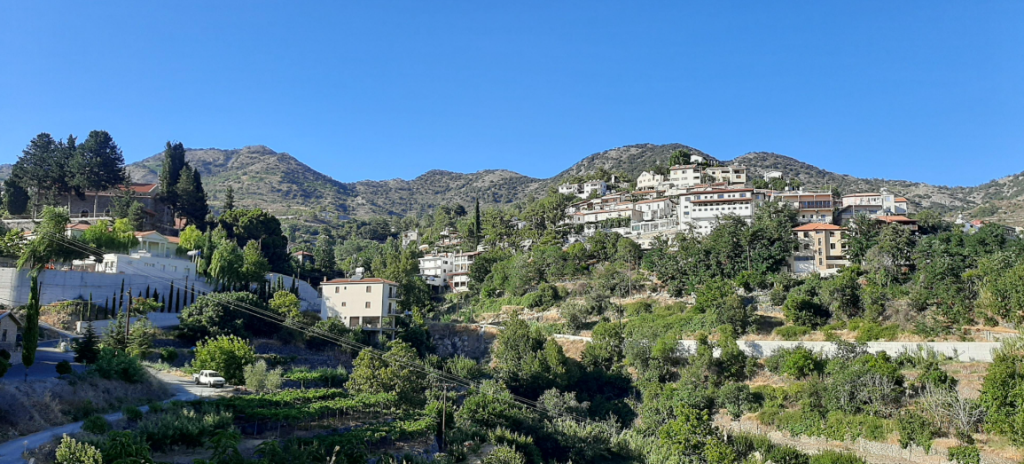- Content
The selection of land plots with a building permit in Cyprus is an important aspect of investment activity, especially with the growing interest in the real estate market on this island. Cyprus has traditionally attracted investors due to its favorable tax system, strategic location, stable political situation and infrastructure development. The process of selecting land plots with building permits requires attention to legal, financial and environmental aspects, as well as a detailed analysis of the land laws and procedures involved in obtaining permits. This analysis examines key aspects of selecting land plots with building permits, including legislative and practical aspects, as well as real-life case studies.
1. Land and real estate market in Cyprus
The Cyprus real estate market is experiencing a phase of active growth due to the increasing interest from foreign investors. There is a particularly high demand for land plots with building permits, as such plots represent a valuable investment allowing for the construction of residential, commercial or hotel properties.
In recent years, the land market in Cyprus, particularly in the areas of Larnaca, Limassol and Paphos, has been experiencing rapid development due to the growth of tourism and infrastructure improvements. According to the Center for Cyprus Economic Research (CERA), the number of real estate transactions in Cyprus in 2022 increased by 10% year-on-year, including the purchase of land plots with building permits. This is due to the growing pace of urbanization and increased interest from private and corporate investors.
2. Peculiarities of selecting land plots with a building permit in Cyprus
The selection of land plots with a building permit in Cyprus is a complex process that requires careful analysis of legal, financial and environmental aspects. The success of an investment project depends on how well a plot is selected and how fully all its characteristics are studied. In this section, we detail the key features of selecting land plots with building permits, including the legal, urban planning and environmental aspects, as well as the process of obtaining a building permit.

2.1 Analysis of the Legal Component
One of the first steps in selecting land plots with a building permit is to check their legal cleanliness. All plots that are intended for construction must be free from legal impediments and legal disputes. In Cyprus, there are several important factors to consider when checking land titles:
- Land ownership: Under Cypriot law, in order for a buyer to safely and legally purchase a plot of land, it is necessary to verify that the seller is the legal owner. The following forms of ownership are possible in Cyprus:
- Private ownership – land owned privately and transferred to individuals or legal entities without restriction.
- Public ownership – land owned by the state and granted on lease or rights of use. In such cases, it is necessary to carefully check the terms of the lease as well as the possibility of transferring the land into private ownership.
For foreign investors in Cyprus there are certain restrictions on the acquisition of land plots, especially in rural areas. For example, non-EU citizens can only purchase land if they obtain a permit from the Cypriot Ministry of Interior.
- Checking the documents for the plot: It is important that the land plot has all the necessary documents confirming its right to build. This includes title deeds, cadastral map, and information on possible encumbrances and legal disputes.
- Historical and legal restrictions: In Cyprus, there are a number of historical restrictions on the use of land associated with archaeological sites or historical sites. If the plot is located in an area with such status, there may be additional difficulties in obtaining a building permit. It is therefore important to check in advance if there are any restrictions on land use..

2.2 Zoning and urban planning regulations
One of the key factors determining whether a building permit can be obtained is the zoning of the land. Cyprus is divided into several zones, each with its own land use regulations and building restrictions. These zones determine what types of activities can be carried out on a particular plot of land.
The main zoning categories in Cyprus are as follows:
- Residential zones (Residential zones): These zones are intended for the construction of residential houses, apartment complexes or country houses. In residential zones there are certain restrictions on density, building height and other parameters. For example, in the R3 zone, apartment buildings are allowed, but only within a certain density.
- Commercial and business zones: Land in these zones is designated for office buildings, retail, hotels, and other commercial uses. These zones are often located in cities where business activity is growing. When selecting a site in these zones, it is important to consider not only building permits, but also connectivity to city infrastructure.
- Agricultural zones: These zones presuppose the use of land for agricultural production. However, in some cases it is possible to change the status of the land to residential or commercial, but this requires permits.
- Tourism zones: Plots in these zones are intended for the construction of hotels, resort complexes and other facilities related to tourism. Typically, these areas are located in coastal areas or areas with highly developed tourism infrastructure.
2.3 Процесс получения разрешения на строительство
The zoning of land plots is determined in accordance with the Town Planning Law. This document establishes the rules for development in different districts and regulates the types of buildings allowed, building density, height restrictions and other parameters. Before selecting a site for construction, it is important to carefully examine its location in relation to the zones that allow the construction of a particular type of facility.
Once the site has been selected and the relevant legal and town planning requirements have been met, the next step is to obtain a Building Permit. This is a mandatory permit that is required before construction work can begin. Obtaining a permit involves several key steps:
- Preparation of project documentation: In order to obtain a permit, a construction project must be prepared by a certified architect and engineer. The project must take into account all requirements specified in the local building code and be coordinated with the town planning plan.
- Submitting the application to the local municipality: Once the project documentation has been prepared, the application for a permit is submitted to the local municipality. The application includes information about the land plot, purpose of construction and project details. It is also necessary to attach various documents such as cadastral data, land rights, utility approvals and others.
- Verification of project documentation: The municipality checks the project for compliance with all requirements, including safety, environmental standards, and whether the project complies with zoning and building plans. If the project meets all requirements, a building permit is issued. This process can take from several months to a year, depending on the complexity of the project and the density of development in a particular region.
- Obtaining permits for infrastructure connections: In addition to the building permit, approvals must be obtained from utilities such as water, electricity, sewerage and other systems. This process can also take time and require additional documents.

2.4 Peculiarities of site selection by type and purpose
The choice of land plot depends on what type of property you plan to build and in which region of Cyprus. There are several specific factors in Cyprus that can influence your choice:
- Residential Plots: Large cities such as Limassol, Larnaca and Nicosia have a high demand for residential developments, making land plots in these areas a favorable choice. However, it is important to consider the density of development, as there may be restrictions on building heights and plot size in central city areas. Suburbs or resort areas such as Paphos or Protaras offer plots with more opportunities for residential developments and private houses..
- Commercial plots: Plots intended for the construction of office buildings or retail facilities are usually located in the business districts of large cities or in close proximity to tourist areas. It is important to consider the availability of developed infrastructure, transportation routes and logistical accessibility, which will affect the success of the business.
- Tourist plots: There is a high demand for hotel and resort plots in Cyprus, especially in coastal areas. It is important to consider not only zoning and permitting, but also environmental factors such as protection of coastal ecosystems and project compliance with environmental standards.
2.5 Environmental aspects of site selection
Environmental factors must also be taken into account when selecting a plot of land. The Cyprus authorities actively protect the environment and strict environmental standards must be adhered to when building on sites with natural or archaeological values. For example, construction work near nature reserves or archaeological sites may require additional environmental and historical-cultural studies.
3. Legal aspects and legislative peculiarities
Cyprus land law is governed by a number of acts, including:
- The Land Code (Land Code): It contains basic provisions on ownership, use of land, and procedures for registration of land rights.
- Building Law: This law regulates the process of obtaining building permits as well as setting requirements for building standards.
- General Development Plan (Town Planning Law): Establishes zoning standards and land use regulations in different neighborhoods.
In practice, it is important to work with local lawyers and real estate consultants to ensure compliance and avoid legal problems.
4. Examples of successful projects
Case Study 1: In the Limassol area, a plot of land with a building permit was selected for the development of a residential complex comprising apartments and commercial space. The permitting process took 6 months, including design approval and coordination with local authorities. As a result, the complex was successfully realized and sales of the apartments started within a year.
Case Study 2: In Paphos, a plot of land was purchased with a permit to build a hotel complex. As the plot was located in a tourism zone, the permit was obtained fairly quickly, but it took time to obtain additional permits for infrastructure connections. The project was completed on time and the facility has become one of the popular hotel complexes on the coast.
Conclusion
Selecting land with a building permit in Cyprus requires careful attention to legal, environmental and construction requirements. Cyprus offers favorable conditions for investors seeking land for residential, commercial and tourism projects. However, the process of obtaining a building permit can be complex and requires compliance with a number of regulatory requirements. Knowing the legislation, working with professional advisors and following all procedures will minimize risks and allow you to successfully implement construction projects in Cyprus.
Why choose AlmanovaLaw
AlmanovaLaw is one of the leading law firms in Cyprus providing services for Israeli citizens. With more than 15 years of experience, the company has gained the trust of its clients due to:
- A high level of professionalism. All lawyers of the company have significant experience in various areas of Cyprus law, which allows to provide a comprehensive solution of problems.
- Individual approach. AlmanovaLaw understands that each client is unique, so each case is considered individually, taking into account all specific requirements.
- Comprehensive support. The company’s clients can count on comprehensive support at all stages of cooperation – from the first consultation to the completion of all procedures.
Contact AlmanovaLaw to get professional legal assistance in Cyprus and benefit from all the advantages of this unique destination.
Choose a plot of land in Cyprus with a building permit







